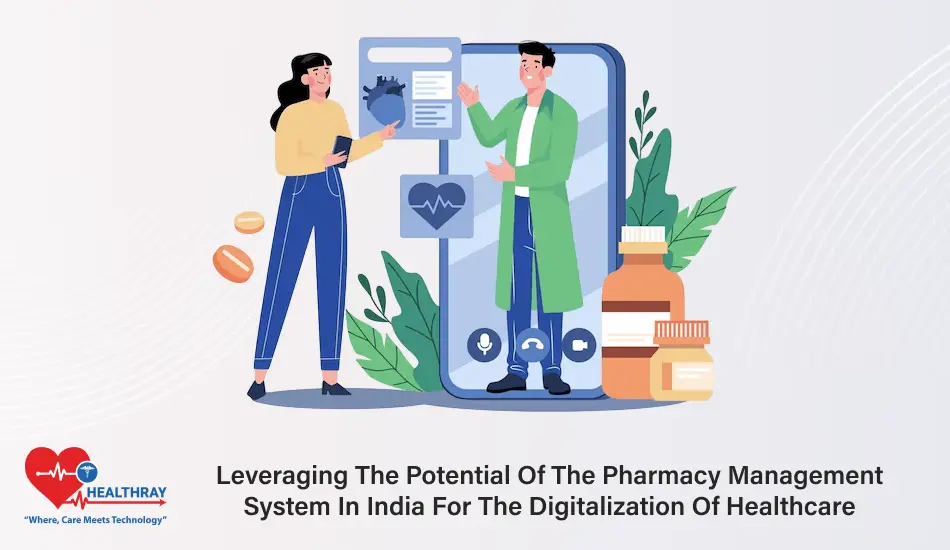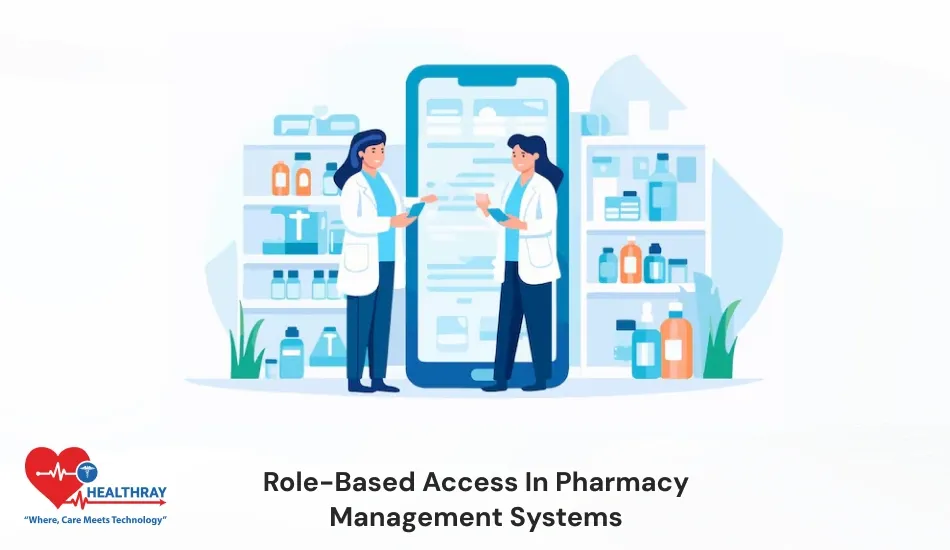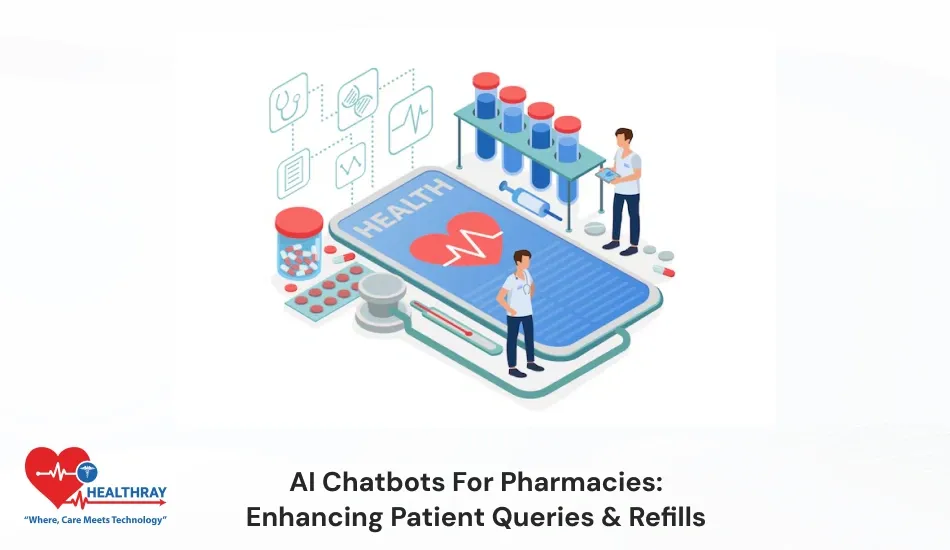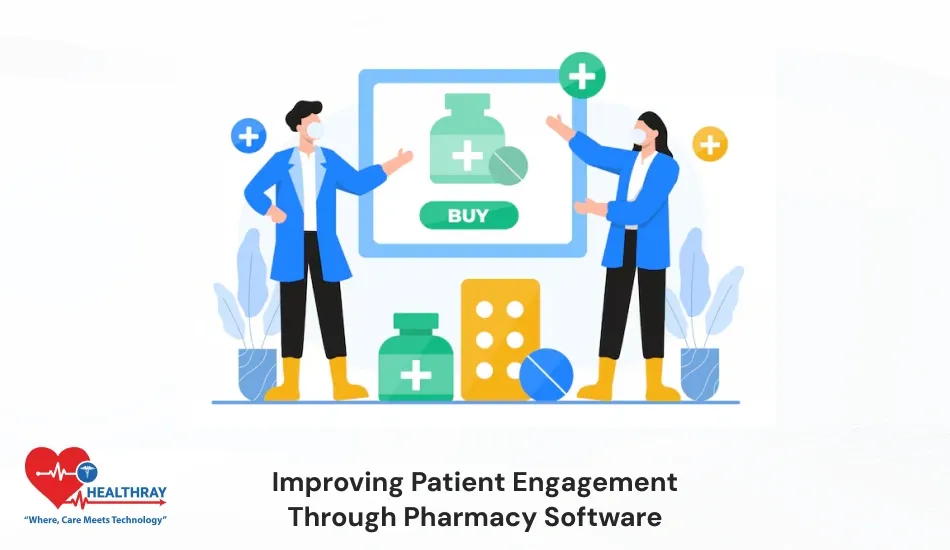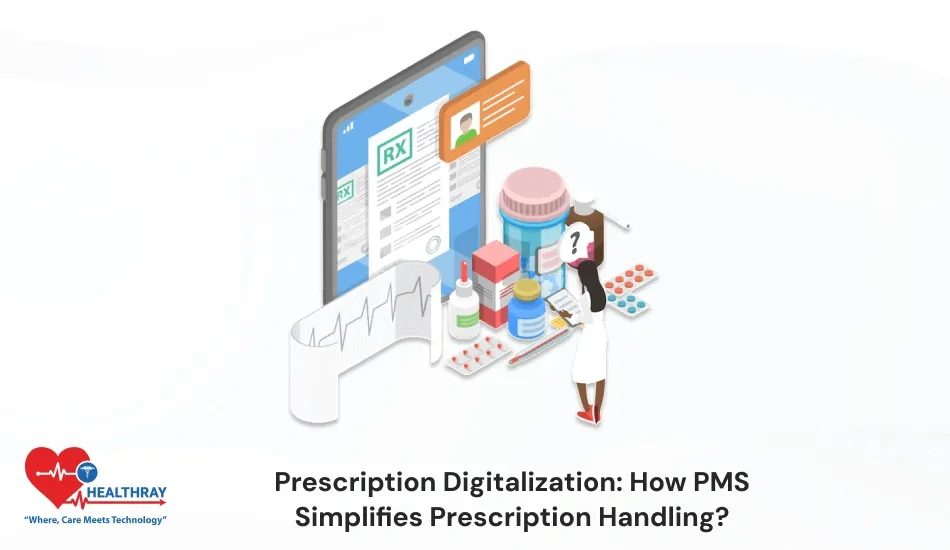Over the last few years, especially in India, PMS has emerged as the backbone of the ongoing digital revolution in healthcare. It helps regulate inventory, boosts patient safety, and assures regulatory compliance. But is PMS about just managing stock, or does it provide a gateway towards changing the way healthcare is delivered?
The following post discusses how the Pharmacy Management System is changing not just the way pharmacies operate but also opening the way for broader healthcare digitization. We explore the leading system features, benefits from Pharmacy Management System adoption, and specific challenges related to the Indian healthcare ecosystem.
What is Pharmacy Services Management Software?

PMS is a digital tool automating and streamlining the operations of a pharmacy. It aids in inventory management, billing, handling prescriptions, and maintaining compliance with regulations. But above these bare essentials, PMS plays a critical role in improving efficiency and accuracy within the operation of a pharmacy.
Core Features of Pharmacy Management System:
1.Inventory tracking: Automates stock updates to avoid shortages or overstocking.
2.Prescription management: Accurately dispenses medications by incorporating digital prescriptions.
3.Billing and Payments: This makes paying easier by integrating systems for billing and GST compliance.
4.Regulatory Compliance: Maintains records according to local laws and regulations to minimize compliance risks.
5.Analytics and Reporting: Offers insight into sales, inventory trends, and customer behavior.
Why is PMS important in healthcare digitalization?
Service providers within this management system form a basis for the integration of the pharmacy into larger healthcare networks as the whole industry of health becomes more data-driven. It allows the real-time exchange of data among pharmacies, hospitals, and health care providers that will enhance patient care and operational transparency.
This is the foundation that will make digital healthcare efficient, accurate, and centered on patients.
The Role of PMS in Healthcare Digitalization
From simple inventory management, the PMS today has grown into an important piece in the digitalization of health chains. This becomes all the more important because healthcare is a problem different for India, with high loads on patients and fragmented care systems.
Enabling Integrated Care Networks
The PMS links the pharmacies with the hospitals, clinics, and diagnostic centers. It enables the easy sharing of data and always presents the records of the patient, prescriptions, and case histories, thereby avoiding errors and assuring continuity of care.
Improving Patient Safety
Some of the major concerns in health care involve medication errors. This is addressed in PMS through prescription validation systems that will ensure the right choice of drug and proper dosage. It can be further enhanced to include an alert system for drug-drug interactions or allergies.
Supporting telemedicine
Telemedicine is thus one of the fastest-growing verticals in India, and PMS therefore has great importance in the present scenario. Now, patients can get digital prescriptions; pharmacies with integrated PMS can process such prescriptions immediately, thereby meeting the fast-growing demand for remote health services.
Optimizing Pharmacy Operations
PMS automates many repetitive and time-wasting tasks, such as restocking and stock counts, so the pharmacist will be able to care more about the patient. A much more important feature is that it updates stock inventory in real time, thus enabling a hospital pharmacy to manage the available resources better.
Ensuring Regulatory Compliance
The rules and regulations relating to Indian healthcare are quite strict, especially when it comes to the dispensing and sales of drugs. The PMS automates compliance tasks that involve record-keeping and tax filling, hence reducing the risk of any legal complications.
Driving Data-Driven Decisions
A lot of data is usually collected from the pharmacies. PMS organizes that data into actionable insights for the pharmacy and healthcare provider to make informed decisions in the improvement of service delivery.
Key Benefits of Pharmacy Management Software for Hospital Administrators, Software Providers, and Policy Makers
PMS avails different actors in the healthcare ecosystem with unique benefits. Consider looking closer at the needs of the hospital administrator, software developer, and the policymaker through the use of PMS.
For hospital administrators
1.Smooth Operation
PMS automatically manages inventory, prescriptions, and billing. It reduces manual errors and helps in efficiency within the hospital pharmacies.
2.Cost Control
It prevents overbuying and reduces waste, thus enabling hospitals to work within the budget.
3.Improved patient experience
It was with the integration of PMS into the hospital system that patients were able to experience quicker service, proper distribution of medication, and fewer delays.
For Healthcare Software Providers
1.Market Opportunity
Growing demands for digital tools in healthcare make PMS a lucrative vertical for software providers; further, the customization of solutions to fit Indian regulations is one more factor that gives such providers an edge over others.
2.Scalability and Integration
PMS solutions can be designed to integrate seamlessly with electronic health records and other hospital systems, further enhancing their value proposition.
3.Driving Innovation
The functionalities such as AI-driven analytics, support for telemedicine, or predictive inventory management can be deployed by software providers using the platform of Hospital Pharmacy Management.
Policymakers
1.Better Regulation and Oversight
PMS gives records of the drug sales, prescriptions, and inventories in detail. Such data helps trace compliance by regulatory bodies and aids in fighting against fake medicines.
2.Improved Public Health Data
The aggregated data from community pharmacies can assist, through PMS, in informing public health initiatives, monitoring trends in disease, and improving drug supply chains.
3.Health Digitalization Promotion
Encouragement toward the implementation of PMS also aligns with goals that India has set out for an increasingly integrated and effective healthcare system. Adoption could be incentivized by policymakers through subsidies, training programs, or tax benefits.
Challenges in Implementing Pharmacy Management Software in India
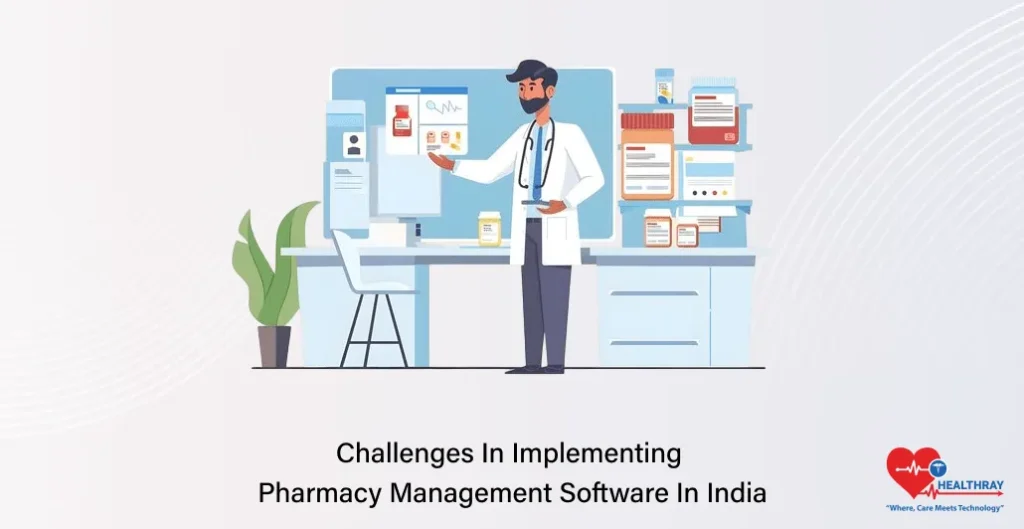
While much potential exists, the adoption of pharmacy management software in India is not without its barriers. The removal of these barriers will be important so that PMS can be more widely adopted and implemented into the market.
Cost Issues
Initial Investment: Most small-scale pharmacies and healthcare centers cannot afford the initial investment cost of the PMS software and hardware required to run it. This is particularly true in rural areas where margins are thin.
Ongoing Expenses: Maintenance costs, software upgrades, and training add to the financial burden that discourages adoption.
Resistance to Change
Lack of awareness: Most pharmacy operators, in particular independents, are unaware of what a PMS can add to the operation.
Cultural Resistance: Most pharmacists and practitioners are accustomed to manual systems, and thus tend to fear digital instruments for their perceived complexity.
Limited Digital Infrastructure
Connectivity Issues: A large part of India still faces poor internet connectivity, and implementing a cloud-based PMS solution is a challenge.
Hardware Availability: Most rural or semi-urban pharmacies do not have the required hardware, such as a barcode scanner or a POS system, to use PMS in an effective manner.
Data Security and Privacy
Regulatory Compliance: It may be challenging for software providers to make PMS compliant with data privacy laws such as the Personal Data Protection Bill.
Cybersecurity Risks: Since the PMS systems handle sensitive patient and pharmacy information, they become potential points of cyber-attack and, therefore, need very robust security measures.
Integration Issues
Compatibility Issues: Most of the pre-existing hospital and pharmacy systems were not designed to integrate with PMS, and required additional investments to bridge the gap.
Fragmented Issue: The healthcare sector in India is very fragmented, and that creates many challenges for implementing a uniform digital infrastructure.
Training and Support
Skill Gaps: Most of the personnel working in the pharmacies lack sufficient technical skills regarding the operation of the PMS; thus, proper training is always necessary.
Lack of support: Smaller software providers often do not offer regular after-sales support, which makes the pharmacies unable to get technical issues resolved on time.
Future Prospects of PMS in India’s Healthcare Digitalization
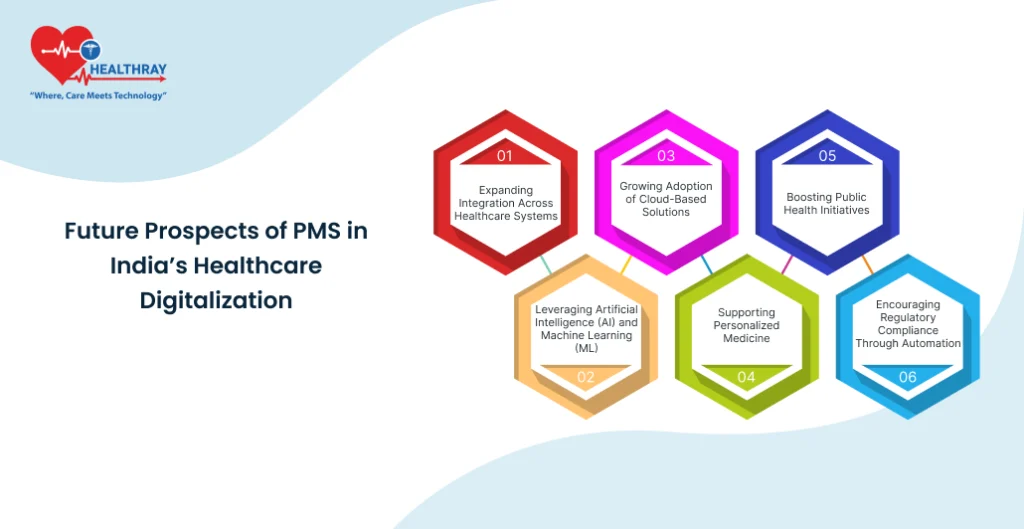
PMS will be one of the mainstays of India’s overall digitalization journey in its healthcare segment. As the technology advances and digital tool adoption rates go up, this can really transform not just pharmacy operations but the ecosystem of health care as such.
Increasing Integration Across Health Care Systems
With increasing integration of hospitals, diagnostic centers, and telemedicine platforms, PMS will stand at the core of this system integration. Electronic health records, or EHR, will be integrated with teleconsultation platforms and insurance providers to provide one smooth healthcare experience for the patients.
With the power of Artificial Intelligence and Machine Learning,
Predictive analytics and AI-driven insights are the future of pharmacy systems in forecasting inventory needs, conducting the best possible optimization within supply chains, spotting looming drug shortages, and preventing harmful drug interactions that result in patient harm.
Growing Adoption of Cloud-Based Solutions
Cloud-based PMS platforms are more popular nowadays due to their scalability, affordability, and accessibility. It avoids heavy capital investment in hardware and ensures data availability from anywhere. It suits the vast geography of India.
Supporting Personalized Medicine
With the interest in personalized medicine on the rise, PMS can play a very significant role in maintaining highly sophisticated patient profiles. This would give the pharmacist the ability to better individualize medications and dosages according to specific patient needs, thus optimizing treatment outcomes.
Strengthening Health Promotion Programs
Aggregated data from the PMS systems can offer very constructive insights into public health planning. The policymakers can leverage such valuable data to identify disease patterns and monitor drug utilization, as well as make optimized resource allocations during periods of health crises.
Encouraging Regulatory Compliance through Automation
Future PMS platforms will have advanced compliance tools that are in line with evolving healthcare regulations. Automation of record keeping and reporting will ease compliance with the law and reduce administrative burdens for pharmacies.
Conclusion
PMS is not merely a tool to smoothen pharmacy operations but a very important building block for the healthcare digitalization of India. With automation, improved patient safety, and integration with larger healthcare systems, PMS holds immense potential to change how pharmacies and hospitals function. To hospital administrators, PMS signifies greater efficiency and cost savings. For software providers of HMS, this is a growing market filled with opportunities to innovate. To the policymakers, PMS strengthens regulatory compliance besides providing actionable data on public health initiatives. Up front, there are challenges to be faced-cost barriers, limited digital infrastructure, and training gaps. Collaboration and technology can make PMS a cornerstone in India’s healthcare. A shining future in health digitalization is ahead of us, and amongst those leading contributors to this transformation will be PMS.
